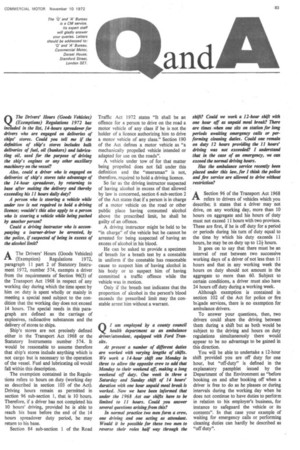1 -1 I am employed by a county council ' 14 4e health department as an ambulance driver/attendant, equipped with Ford Transits.
Page 81

If you've noticed an error in this article please click here to report it so we can fix it.
At present a number of different duties are worked with varying lengths of shifts. We work a 14-hour shift one Monday in three to allow the opposite crew to add that Monday to their weekend off, making a long weekend off duty. One week in three a Saturday and Sunday shift of 14 hours' duration with one how unpaid meal break is worked. Now we have been informed that under the 1968 Act our shifts have to be limited to 11 hours. Could you answer several questions arising from this?
In normal practice two men form a crew, one driving and one acting as attendant. Would it be possible for these two men to reverse their roles . half way through the shift? Could we work a 12-hour shift with one hour off as unpaid meal break? There are times .when one sits on station for long periods awaiting emergency calk or performing cleaning duties. Could one remain on duty 12 hours providing the 11 hours' driving was not exceeded? I understand that in the case of an emergency, we can exceed the normal driving hours.
Has the ambulance service recently been placed under this law, for I think the police and fire service are allowed to drive without restriction?
ASection 96 of the Transport Act 1968 refers to drivers of vehicles which you describe; it states that a driver may not drive, on any working day, more than 10 hours on aggregate and his hours of duty must not exceed 11 hours with two provisos. These are first, if he is off duty for a period or periods during his turn of duty equal to the time by which his duty exceeds 11 hours, he may be on duty up to 124 hours.
It goes on to say that there must be an interval of rest between two successive working days of a driver of not less than 11 hours and that in any working week the hours on duty should not amount in the aggregate to more than 60. Subject to certain conditions, a driver must also have 24 hours off duty during a working week.
Although exemption is contained in section 102 of the Act for police or fire biigade services, there is no exemption for ambulance drivers.
To answer your questions, then, two drivers could share the driving between them during a shift but as both would be subject to the driving and hours on duty regulations simultaneously there would appear to be no advantage to be gained in this direction.
You will be able to undertake a 12-hour shift provided you are off duty for one hour, but "off-duty" is defined in the explanatory pamphlet issued by the Department of the Environment as "before booking on and after booking off when a driver is free to do as he pleases or during intervals during the working day when he does not continue to have duties to perform in relation to his employer's business, for instance to safeguard the vehicle or its contents". In that case your example of waiting for emergency calls or performing cleaning duties can hardly be described as "off duty".




































































































































